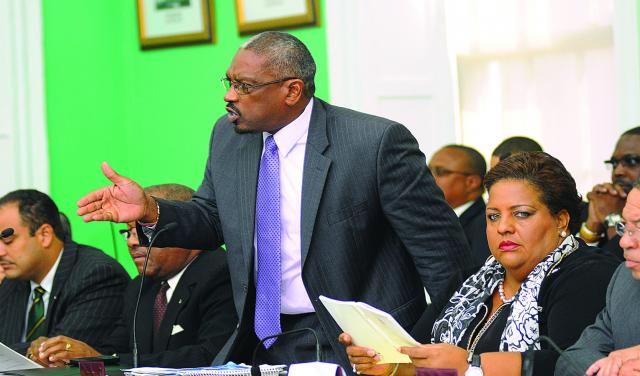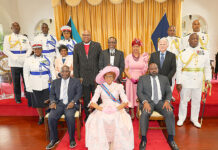Dr. Minnis lay a case against Stem Cell Research in the Bahamas!

REMARKS BY
HON. DR. HUBERT A. MINNIS,
MP FOR KILLARNEY AND LEADER OF THE OPPOSITION
HOUSE OF ASSEMBLY CONTRIBUTION
STEM CELL RESEARCH AND THERAPY BILL, 2013
July 3rd, 2013
Nassau, The Bahamas
Mr. Speaker,
I rise to make my contribution on the Stem Cell Research and Therapy Bill tabled today.
First and foremost, I state that I am a trained medical doctor. I am by general disposition a scientific and results driven individual. I have always harboured a fierce commitment and focus on improving the healthcare in The Bahamas at large.
Naturally, I am a supporter of medical research and development; without it we would still be practicing medieval medicine treating hemorrhoids with hot irons, advising pregnant women to prepare for their deaths at childbirth and treating just about every other ailment with bloodletting. So I am not automatically opposed to the idea of stem cell research and therapies.
In developed countries like the USA and Canada but also in the Middle East and in Thailand, following years of discussion and debate including moral and ethical issues connected to stem cell research, some levels of stem cell research and therapy have been authorized and even supported by Governments.
Mr. Speaker,
For many sound reasons I do not believe that the Bahamas ought to be involved in stem cell research at this time.
The Bahamas has yet to achieve ideal primary health care services for its citizens where they live whether in New Providence, Grand Bahama or any of our Family Islands. We have only recently updated emergency and operating theatres in Grand Bahama, the critical care unit at the PMH is still under construction – we have no information that the facility will be adequately staffed following the discontinued employment of persons trained under the 52 Week Jobs and Skills Training Programme and the paucity of money in the budget for training for specialists nurses and technicians.
We have only now begun to build small hospitals on Exuma and Abaco. It is my hope that plans by the last FNM Government to expand the number of small hospitals to other populous islands – Eleuthera, Long Island, and Andros for example will not be shelved.
Our advance toward full national health insurance is stuck somewhere in a working group, committee or commission of this Government. The Member for Centreville recently told the press that the lack of progress on the national health Act was my fault.
I wish to remind Honourable Members that when the Member for Centreville last led the government between 2002 and 2007 he saw to it that a National Health Act was enacted in the closing months of his term. The FNM Government won the election in 2007. We did not bring the National Insurance Act into force because the healthcare system of the country was not in condition to support a true national health insurance programme. But we did nothing to the Bill. Separately, we put in place the Prescription Drug Programme.
In the 2012 general election campaign, the members opposite assured the Bahamian people that the National Insurance Act would be brought into effect within the first year of their election to office. They won the election. Now, 14 months after coming to office he has failed to do anything to bring the Act into effect. Instead the Minister of Health has advised that the programme is being reviewed by a Committee — and it’s my fault? Please Mr. Speaker, when will the Government accept responsibility for being the Government?
Mr. Speaker,
We can hardly hope that the Prescription Drug programme will be expanded by this Government to bring increased relief to the neediest in our society – the elderly, infirmed and children; those who are forced sometimes to choose between buying food and buying medicine; paying their electricity bills or buying medicine; or paying the rent or the mortgage and buying medicine.
Indeed, Mr. Speaker, we are plagued by many healthcare issues- an epidemic in non-contagious diseases, public health issues, and medical staff shortages particularly in our southernmost Family Islands.
And, we are being severely challenged by other social, financial and economic issues that all require the timely, focused attention of the Government.
How so challenged a small Government can expect to develop the necessary legislation and regulatory oversight for some of the most advanced medical scientific research taking place today boggles the mind.
Stem cell research and therapy, if it is to be safe, ethical and respected by the international medical profession, must meet international standards and protocols, be open to independent scrutiny and found to be safe. This requires that the country hosting the research must have enforceable laws and be capable of providing the necessary monitoring by recognized specialists in this subspecialty field.
Mr. Speaker,
I do not understand the rush by the Government to bring this Bill to Parliament to regulate a medical research field in which we have no expertise. I understand that there are interested parties who are encouraging the Government in this adventure.
It is urgent that I ask a very fundamental question. Why are medical scientists seeking to conduct such sophisticated research in a country without any capacity for such research? Have they been refused licences in their home countries? Other countries?
Where will the research take place?
Will this highly skilled sub-specialty employ Bahamians?
How many work permits will be issued to employ said specialists? Mr. Speaker, how many will be employed?
How many Bahamians will benefit from this research today, in the next 5years, 15 years?
Will this research provide a cure to any of our health care needs, our social ills or economic problems?
Does the Government expect that this research will produce a new tax stream for the Bahamas? And if so, how?
I hardly believe that we can expect short or medium term financial gains?
So, why the rush to Parliament?
It seems to me, Mr. Speaker that this Government has a greater obligation to fulfill its numerous promises to the Bahamian people than to dream up a scheme to become engaged in the monitoring and regulation of advanced scientific and medical research for which we have neither expertise or experience.
Mr. Speaker,
Already some of the United Kingdom’s leading stem cell experts have issued international warnings concerning “unproven therapy”, patient optimism and predatory clinicians. They further warn that in spite of the evidence of lack of success of cell stem therapies, many patients, as last resort search for a cure and life, continue to present themselves at poorly or unregulated institutions that present themselves as being front runners in the new frontier of stem cell tourism.
They further stated; that these unregulated and poorly regulated institutions hurt the legitimacy of the entire field of stem cell medical science and even go as far as to suggest that parents who allow their children to receive stem cell therapy in these centers should be charged with child abuse.
Surely, we in The Bahamas would fall somewhere within the category of” poorly regulated”. Let us admit, we cannot even enforce our seat belt laws; we do not energetically enforce our traffic laws or vigorously pursue violators. Indeed, many of our laws are observed in the breach. This can hardly be what a concerned government would seek for its country’s medical reputation!
Mr. Speaker,
In 2008, the Multiple Sclerosis Society warned sufferers of the condition not to be taken in by “Integrated Biosciences”, a company registered in Turks and Caicos Islands because there was no scientific backing for their claims and research. Is this what we want for The Bahamas?
Warnings such as this; can have backlash on our established healthcare system with serious consequences for our tourism industry. It is a fact that tourist, particularly those we seek to attract – high-end, long stay tourist, search for destinations with proper infrastructure including safe healthcare facilities
We do not want to become safe harbour for rogue or on–the-run Dr. Jeckels. We may be perilously close Mr. Speaker. The media reports that the past Chairman of the Bahamas stem cell task force is currently awaiting extradition to Canada from Central America.
Mr. Speaker,
I have had discussions with members of our medical fraternity. Many remain today unaware of the present Stem Cell Legislation and Regulation now being debated. I am told that only one meeting was held with the medical association – and only 10 persons were present.
Mr. Speaker, even the government’s task force for Stem Cell Development recommended that there be widespread and inclusive consultation of various stakeholders before the enactment of legislation and/or development of a regulatory regime.
Mr. Speaker, this rush to parliament is in contravention to the recommendation of the government’s own task force. So I ask, has there been widespread consultation, if so when, where and with whom?? Were there any town meetings?
Discussions amongst the more senior physicians in our country revealed the following concerns:
1) need for and lack of capacity to provide proper monitoring
2) a concern with the traditional weak enforcement of laws
3) quantifying the stem cell knowledge and experience of committee members
4) whether this legislation is being pushed to benefit special interest groups.
Mr. Speaker:
The membership criterion of this group is inadequate as outlined in this Bill given the high degree of technical competence required.
In the US, this responsibility lies with the Federal Drug Administration (FDA) that has numerous agencies, infinitely more resources and trained personnel; i.e. Microbiologists, Geneticists, Molecular Biologists, Physicists, and Statisticians (whose responsibility is to evaluate outcomes, any complaints or reactions of products utilized among other tasks) than we could ever hope to have or even attract to our shores.
In 2002, Canada realizing the problems they could encounter with stem cell research set-up similar guidelines and agencies as the USA with responsibility to approve, oversee, enforce and regulate these research centers.
Mr. Speaker,
All investigational products are require to undergo a thorough review process as the sponsor prepares to study safety and effectiveness of the product in adequate and well-controlled human studies (clinical trials).
We have no such protocols or organizations that can confirm the safety of such products. The FDA on the other hand has published comprehensive requirements of donor tissue practice, donor screening and testing requirement to prevent the introduction, transmission, and spread of communicable diseases and possible cancer cells.
Mr. Speaker, how can such a committee as outlined in this Bill, be compared to that of the FDA or to the relevant agencies in Canada? How could the committee to be created by this Bill hope to satisfactorily fulfill the mammoth tasks associated with international standards of regulations, monitoring and enforcement of stem cell research and therapies?
Mr. Speaker, unfortunately in The Bahamas we have no regulatory body that regulates our pharmaceutical products and so we depend on FDA approval, European or UK approval. Now, for stem cell we want to bypass these international bodies and create a local approval committee; a committee reporting to a politician – the Minister. Which Minister in this honorable house is a Microbiologist, Geneticist, Molecular Biologist, or Physicists? Which Minister has a subspecialty in stem cell and is qualified and experienced to appropriately manage this committee?
Mr. Speaker,
In Grand Bahama there is a research center that engages in the treatment of patients using blood products and stem cells which were not approved in The Bahamas.
In 2004, Dr. Marcus Bethel, Minister of Health closed this center as a result of his concerns of safety and our ability to monitor appropriately.
The center was subsequently reopened but it is still not monitored properly in my estimation. In fact, Mr. Speaker, the licensing authority of which this Bill speaks (Hospital and Healthcare Facilities Act), whose responsibility would be to license stem cell centers, was denied entrance to specific rooms within this Grand Bahama facility on multiple occasion.
Further, the authority was denied answers on specific questions such as: what products are you using?
Who ensured the safety of such products?
Mr. Speaker, as reported in the Nassau Guardian on November 20, 2012, the former Minister of Health under the PLP administration, Dr. Marcus Bethel publicly warned of the potential for abuse of this new field of medical science if it is not properly regulated. Dr. Bethel was part of the effort to shut down unauthorized stem cell therapy in the Bahamas in 2004 after it was discovered that such procedures were being performed at a Freeport clinic without any regulations being in place.
The bill before us provides for the utilization of previously derived human embryonic stem cell lines, these are aborted cells from specific centers. If we are currently unable to obtain answers as to from where the stem cells originated that are being utilized in Grand Bahama; how can we be certain that the stem cells are not obtained from fresh specimen.
Mr. Speaker, will we be exposing ourselves to the trafficking of fresh embryonic stem cells and will that subsequently become an underground market within The Bahamas? Mr. Speaker, we cannot act as Pontius Pilate did in days of old and wash our hands!
In countries that have all the regulatory bodies in place, there are two separate regulations, one for previously derived stem cells and another for mature adult stem cells. We today in The Bahamas, in this Bill present one regulation to accommodate both.
We were elected to protect and promote the welfare and interests of the Bahamian people. This Bill does neither of these 2 things.
In conclusion, Mr. Speaker, I ask the government, if they truly believe in this Bahamas, to not embark on this ill-advised adventure into stem cell research. We can too easily suffer a severe response, be blacklisted, be targeted by unscrupulous business and medical personnel who only seek to enrich themselves taking advantage of our lack of experience, lack of capacity to provide proper monitoring and evaluation and more importantly, the inability to stringently enforce the laws of the land.
Mr. Speaker,
Stem cell science holds tremendous potential to benefit thousands if not millions around the world. Hope for revolutionary treatments and cures for myriad conditions have been held out – cancer, Type 1 diabetes, Parkinson’s and Huntington’s diseases, Alzheimer’s, spinal cord regeneration fuel the number of institutions seeking to become involved in the work.
Already considerable success is being achieved with bone marrow transplants for example.
Does this mean that The Bahamas ought to become involved in this advanced scientific work? I am not convinced. I do not believe that we are yet in a position to adequately police this research and to ensure the maintenance of international standards. Hence, I do not believe that The Bahamas should become involved in stem cell research at this time.
I say further, Mr. Speaker, that even if I could be persuaded to support stem cell research in our country I could not support this Bill at this time.
It seems to me, that this adventure into stem cell research and therapies is in truth and in fact an attempt by the Government to fulfill a promise and to appease a resident of the far west and a select group who expect to benefit from the business to be created by this legislation. This has nothing to do with helping hurting Bahamian citizens.
I quote from an article by Jeffrey Todd published in the Nassau Guardian on Dec 4, 2012: “Stem cells ‘biggest moment’ for PM”, “Stem cell therapy is the only way to spark medical tourism, according to fashion mogul Peter Nygard, and The Bahamas must act decisively if it wants to win “the race” to prominence in this field. The Canadian citizen, who is a known supporter and investor in the therapy, is applauding the government for the recent creation of a task force to establish regulations.” The Canadian citizen is also known to be a big financial backer of members opposite.







